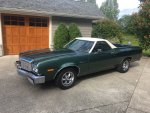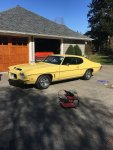Classics Fan
Member
I have 1972 LeMans with the T41 GTO appearance package with 52,000 original miles. A couple of days ago I was setting the ignition timing and adjusting the carb idle mixture. Simple enough but strange things started happening. First the starter seemed to have gone bad from several hot start-ups while adjusting timing. When the key was turned to ignition, the starter would engage for a brief second then all battery power was lost. No interior or instrument panel lights, no horn, etc. The only way to restore power was to disconnect then reconnect the cables at the battery. I jumped to the conclusion the starter was hanging up and voltage was interrupted. Long story short, replacing the starter didn’t fix the issue. What I found that DID resolve the problem was replacing a bad battery cable end on the negative terminal. Well, I guess at least I have a new starter to replace the 48 year old OEM part.
While replacing cable cable ends fixed the starting issue, another problem popped up (all stemming from simple timing adjustment!). While idling in Park at 730 RPM, the GEN light in the dash cluster flickers. If I bump the throttle to approximately 900-1000 RPM (by ear) the flickering fades away and stops but it returns when engine speeds returns to normal idle. I have 14.8 volts at the battery with the engine turning at at any RPM so the alternator seems to be functioning as intended without a problem with the voltage regulator. The battery itself measures 12.6 volts. I am not very electrically inclined. Anyone have any ideas where to go from here?
While replacing cable cable ends fixed the starting issue, another problem popped up (all stemming from simple timing adjustment!). While idling in Park at 730 RPM, the GEN light in the dash cluster flickers. If I bump the throttle to approximately 900-1000 RPM (by ear) the flickering fades away and stops but it returns when engine speeds returns to normal idle. I have 14.8 volts at the battery with the engine turning at at any RPM so the alternator seems to be functioning as intended without a problem with the voltage regulator. The battery itself measures 12.6 volts. I am not very electrically inclined. Anyone have any ideas where to go from here?




